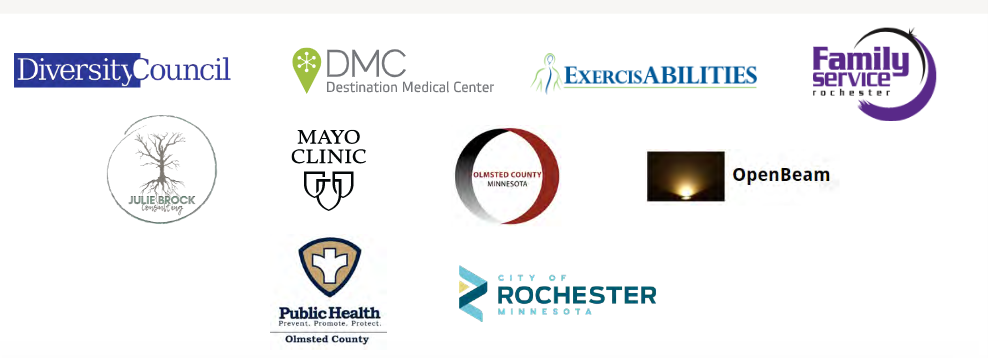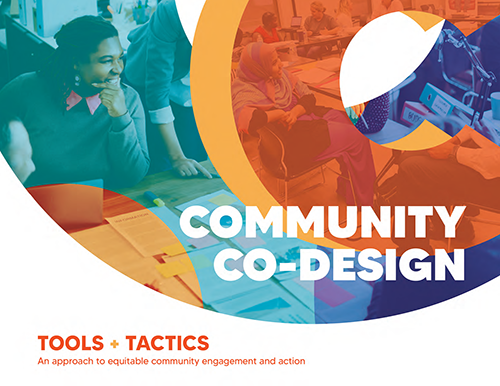What is Community Co-design?
Co-design has become a valued and effective community-centric approach to developing healthy and equitable projects, policies, and practices in the Rochester region. However, we have also seen what can happen if co-design is co-opted as “just another box to be checked”. If you are unfamiliar, co-design is an approach to encourage, compensate, and prioritize the inclusion of diverse populations throughout the design and development process.
Equitable co-design is not traditional community engagement. Equitable co-design aims to address the most persistent inequalities by addressing disproportionate power structures. Co-design is not a good fit for every project or every project team, so before proceeding, please review the prerequisites for effective and equitable co-design in “Assessing Organizational Readiness.”
For more information, please review the Community Co-design guide.
The primary objectives of the co-design process are the following:
1. Meaningfully include diverse voices in the conceptual and design development process through paid positions where community members develop the project’s key principles and measurements for its success.
2. Community members are selected because they or their community is most impacted by the project and have the least amount of access to influencing its development.
3. The requests, conversations, and questions of communities acknowledge and utilize previous research and community input to scope the co-design effort. Co-design explorations are grounded in the lived experiences and assets of the communities most impacted by the project’s development.
4. Through a series of facilitated meetings and individual explorations, the co-designers and their communities, inform a set of guiding principles that the design team can use to develop a more equitable and community-centric outcome.
About Community Co-design
America’s City for Health
Health and wellness go beyond Mayo Clinic’s efforts to include design that encourages healthy lifestyles. One of the goals of the DMC is to help develop Rochester to become an international attraction for those who are focused on wellness, not just coping with illness. That includes providing options for improving health and fitness, effectively managing the increase in visitors and residents, increasing the social connections that foster a vibrant community, and attracting highly trained young professionals to keep Rochester at the top in the healthcare field.
City for Health Steering Committee
A steering committee comprised of Olmsted County and City of Rochester staff, Rochester-area non-profits, and individuals interested in developing an approach to encourage, compensate, and prioritize the inclusion of diverse populations in Rochester in project development was convened to help guide the process.
The Destination Medical Center Economic Development Agency (DMC EDA) and the City of Rochester led the process of designing a linear, 4-block park in downtown Rochester. The DMC EDA is a non-profit organization focused on helping Rochester grow and stewarding the use of $585 million in infrastructure funds provided by the State of Minnesota.

Projects and Reports
Piloting Community Co-design: Discovery Walk Linear Park Project
The Destination Medical Center Economic Development Agency (DMC EDA) and the City of Rochester led the process of designing a linear, 4-block park in downtown Rochester. The DMC EDA is a non-profit organization focused on helping Rochester grow and stewarding the use of $585 million in infrastructure funds provided by the State of Minnesota. During the community engagement process for the design of Discovery Walk, it became apparent that portions of the community had not been consulted about the design principles of the park. A discussion with the City for Health Steering Committee formed the basis for the pilot of a community co-design process where the DMC, Diversity Council, Olmsted County Public Health, and other partners identified community co-designers or individuals that had access to diverse communities including communities of color, elderly, young people, accessibility and other targeted populations. The focus of this group was to identify elements of public space that worked well for these communities in Rochester and identify the key ingredients to make this new park successful, widely used, and accessible to our local community members. For more information, please review the Discovery Walk Linear Park Case Study.
Other Community Co-design Projects
Channel One Food Bank
Channel One, as a food bank and food shelf, participated in the 2019 Minnesota Food Shelf Survey. In summer 2020, as result of pandemic food insecurity, Feeding America released grant funding to “increase efforts to address the priorities and needs of communities, individuals and families most disproportionately affected by the pandemic, its economic fallout, and food insecurity … [with a focus on] the following populations: Black/African Americans, Hispanic/Latino/Spanish, American Indian… [and] rural communities.” For more information, please review the Channel One Food Bank Case Study
Bloomberg Philanthropies Mayor’s Challenge: BIPOC Women Participation in the Built Environment
Less than 1% of the construction industry positions in Rochester are held by women of color. Attempting to create a solution in isolation without women of color and industry leaders at the table will be ineffective and has the potential to do more harm than good. The best way to ensure that solutions are feasible, culturally appropriate, and sustainable is to involve both women of color and industry professionals in the co-design process. For more information, please review the Rochester Built Environment Report.
GRAUC (Greater Rochester Advocates for Universities & Colleges) Healthcare Simulation Center
The GRAUC co-design project objectives were to facilitate a co-design effort with theGRAUC Simulation Collaborative and its partners to develop stakeholder-centered strategies and design guidance to equitably, “enhance and expand the Rochester area healthcare workforce by providing access to relevant, effective, and flexible simulation technology for current and future workers.”
Establishing a community resource for healthcare simulation will ensure that our regional education providers and healthcare institutions can bolster Rochester’s reputation for quality equitable education and medical care. The mission of the Center is to provide educators and current and future learners with an innovative training facility and outreach strategy in Southeast Minnesota which provide competencies and skills necessary to build a proficient and collaborative workforce for the future.
Main Street Grant Program
Destination Medical Center (DMC) received a 3 million dollar grant from the Minnesota Department of Employment and Economic Development (DEED) to invest in the DMC boundary area, which includes the downtown area. As the grant requires an emphasis on diverse-owned business owners, DMC wanted to co-design the application process that both encourages and supports diverse-owned businesses to a successful submission. For more information, please review the Main Street Grant Application Report.
BIPOC Home Ownership Co-Design
Minnesota Has one of the largest racial homeownership gaps in the country. The 2020 Olmsted County Comprehensive Housing Needs Assessment indicates that this disparity is even greater in Olmsted County with 77% White household homeownership compared to 22% for Black/African American households. The Coalition for Rochester Area Housing is seeking advice and counsel from our local BIPOC community. For more information, please review the BIPOC Home Ownership Community Co-design Project Report.
Learning and Training
Community Co-Design Updates
Please contact Wafa Elkhalifa: [email protected] to sign up for the Community Co-design Updates meeting.
Community Co-Design Leadership Training
The training will consist of two in-person sessions which will be modeled to offer the experience of being a part of a co-design process. In between sessions, you will have the opportunity to practice being a community researcher/designer and explore opportunities for co-design with colleagues and other partners. This training is ideal for organization leaders, community leaders, municipalities and department leaders, community developers, project managers, communication managers and professionals, and anyone who specializes in equitable community engagement and decision-making.
Some objectives of this training are:
• Understand the community co-design process and purpose.
• Know how to identify projects that are well suited for co-design as well as when projects might be better suited for other methods.
• Learn how to evaluate and ensure a co-design project is set up for success and is largely consistent in process and intention.
• Build a shared language around co-design.
• Identify projects and collaborations for co-design in the future.
• Develop a relationship with a team that can offer ongoing support and coaching to apply co-design.
Please contact Wafa Elkhalifa: [email protected] to register for the next co-design leadership training cohort.
Community Co-Design Facilitators
Co-design facilitation is about collaborating with and empowering co-designers (community stakeholders) to share questions, insights, and feedback and feel safe in doing so. The facilitation process is about asking the right questions at the right times and in a curious manner to best elicit and capture the lived experiences of the communities that your co-designers are part of and allowing these lived experiences to drive the co-design process and outcomes.
Meet Our Co-Design Facilitators












Community co-design facilitation is becoming an essential, needed, and increasingly sought-after skill in our community. It can be used to support co-design efforts within your organization or as a useful skillset for consulting with communities and organizations. It can also be used to help organizations to facilitate internal projects or as a consultation opportunity for projects outside of your organization’s scope of work. The co-design facilitation training will be offered through a combination of virtual and in-person modules. Participants can expect to spend 20-25 hours on instruction and activities.
Please contact Wafa Elkhalifa: [email protected] to register for the next co-design facilitator training cohort.
